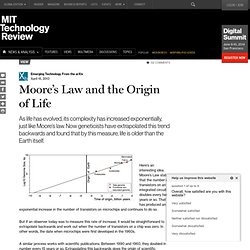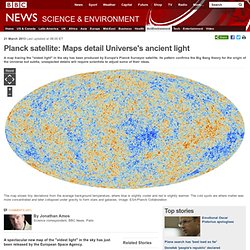

Scientific American sur Twitter : "These 4 #climate trends reveal what's happening to our changing Earth: #science. State of Earth in 4 Climate Trends. What better day to step back and take stock of the planet than Earth Day?

Started in 1970 to raise awareness in the U.S. about the environmental state of the planet, Earth Day is now celebrated in more than 190 countries and has led to the creation of legislation in the U.S. aimed at protecting the environment. But one global trend has continued to alter the world—the rise of carbon dioxide and other greenhouse gas emissions, which have led to an ever-rising average global temperature. It’s easy to get caught up in individual records or wondering what influence climate change has on extreme weather events. But to really understand climate change, the trends are what matter. Here are four that make it clear how our planet is changing. The Number: 400 ppmThe Trend: Current level of CO2, up from pre-industrial levels of 280 ppm Even though carbon dioxide doesn’t make up much of the Earth’s atmosphere, its heat-trapping ability helps prevent Earth from being cold and barren, like Mars.
The Internet Is Improving the Way We Communicate. Panic about the rise of social media is largely overhyped and misplaced.

True leaders gone, of land and people.We choose no kin but adopted strangers.The family weakens by the length we travel. —Jane’s Addiction, “Three Days,” 1990 It seems pretty obvious to most observers that our social networks have changed in the past few decades thanks to technology. The widespread use of cell phones, the increasing affordability of air travel, the rise of the Internet, and the advent of social media have changed the way we work, the way we live, and the way we make and maintain friendships. For some, this is cause for concern. Last week, I attended a lecture on this topic by Barry Wellman at the Political Networks Conference in Montreal. We no longer require homes, offices, or cafes to stay in touch with people; we can do it wherever we happen to be. Science and Spirituality: Jeff Lieberman at TEDxCambridge 2011. Naomi Klein: How science is telling us all to revolt. In December 2012, a pink-haired complex systems researcher named Brad Werner made his way through the throng of 24,000 earth and space scientists at the Fall Meeting of the American Geophysical Union, held annually in San Francisco.

This year’s conference had some big-name participants, from Ed Stone of Nasa’s Voyager project, explaining a new milestone on the path to interstellar space, to the film-maker James Cameron, discussing his adventures in deep-sea submersibles. Medical breakthroughs missed because of pointless drug bans. In 1632 the Catholic Church convened a case against Galileo on the grounds that his work using the telescope to explore the nature of the heavens contradicted the church’s teaching - the culmination of a long fight that had lasted 16 years.

Galileo was put under house arrest and his research stopped. Some of his inquisitors refused even to look down a telescope, believing it to be the work of the devil. With his life under threat, Galileo retracted his claims that the earth moved around the sun and was not the centre of the universe. A ban by the papal Congregation of the Index on all books advocating the Copernican system of planetary motion - which we use today - was not revoked until 1758. Three centuries later we have an equivalent case of scientific censorship. However, another major impact of these laws – restriction of research - has hardly been discussed. A research black hole The ban was largely driven by political concerns. How to encourage moral behavior. Suppose a high school student cheats on a test.

How harshly should a parent or teacher treat this offense? The efficacy of punishment in such situations has been controversial, and a new study sheds some light on the consequences of punitive control in moral matters. When someone behaves immorally, a psychologist would typically say that the individual has not internalized the moral norm; that is, she may profess that an action is morally wrong, but she has not really taken that information to heart. How can a parent or teacher encourage such internalization? Scientists find key to ageing process in hypothalamus. Moore's Law and the Origin of Life. Here’s an interesting idea.

Moore’s Law states that the number of transistors on an integrated circuit doubles every two years or so. That has produced an exponential increase in the number of transistors on microchips and continues to do so. But if an observer today was to measure this rate of increase, it would be straightforward to extrapolate backwards and work out when the number of transistors on a chip was zero. In other words, the date when microchips were first developed in the 1960s. A similar process works with scientific publications. Today, Alexei Sharov at the National Institute on Ageing in Baltimore and his mate Richard Gordon at the Gulf Specimen Marine Laboratory in Florida, have taken a similar to complexity and life. Planck satellite: Maps detail Universe's ancient light. By Jonathan Amos Science correspondent, BBC News, Paris A spectacular new map of the "oldest light" in the sky has just been released by the European Space Agency.

TV time 'does not breed badly behaved children' 25 March 2013Last updated at 21:24 ET By Michelle Roberts Health editor, BBC News online The study's lead author Dr Alison Parkes and Jane Gentle from Mumsnet discuss the findings Spending hours watching TV or playing computer games each day does not harm young children's social development, say experts.

The Medical Research Council (MRC) team who studied more than 11,000 primary school pupils says it is wrong to link bad behaviour to TV viewing. Although researchers found a small correlation between the two, they say other influences, such as parenting styles, most probably explain the link. But they still say "limit screen time". Scientists examine nothing, find something.
Where did the speed of light in a vacuum come from?

Why is it 299,792,458 meters per second and not some other figure? Skip to next paragraph Subscribe Today to the Monitor Click Here for your FREE 30 DAYS ofThe Christian Science MonitorWeekly Digital Edition. Allan Savory: How to green the desert and reverse climate change.
John Vervaeke - Chi Explained Without Magic. "CHASING ICE" captures largest glacier calving ever filmed - OFFICIAL VIDEO. Thomas Metzinger on brain and the nature of. Atoms Reach Record Temperature, Colder than Absolute Zero. Absolute zero is often thought to be the coldest temperature possible.

But now researchers show they can achieve even lower temperatures for a strange realm of "negative temperatures. " Oddly, another way to look at these negative temperatures is to consider them hotter than infinity, researchers added. This unusual advance could lead to new engines that could technically be more than 100 percent efficient, and shed light on mysteries such as dark energy, the mysterious substance that is apparently pulling our universe apart. An object's temperature is a measure of how much its atoms move — the colder an object is, the slower the atoms are. At the physically impossible-to-reach temperature of zero kelvin, or minus 459.67 degrees Fahrenheit (minus 273.15 degrees Celsius), atoms would stop moving.
Bizarro negative temperatures To comprehend the negative temperatures scientists have now devised, one might think of temperature as existing on a scale that is actually a loop, not linear. Billion-dollar drilling project aims for Earth's mantle. Jane McGonigal:Reality is Broken. Modern parenting may hinder brain development, researcher claims. (Medical Xpress)—Social practices and cultural beliefs of modern life are preventing healthy brain and emotional development in children, according to an interdisciplinary body of research presented recently at a symposium at the University of Notre Dame.
"Life outcomes for American youth are worsening, especially in comparison to 50 years ago," says Darcia Narvaez, Notre Dame professor of psychology who specializes in moral development in children and how early life experiences can influence brain development. The mystery of matter deepens - physics-math - 07 January 2013.